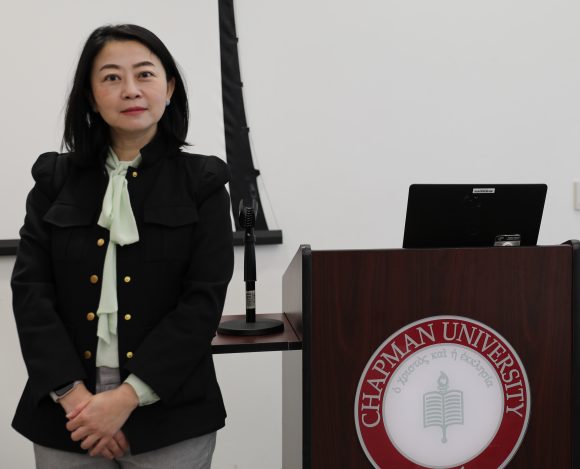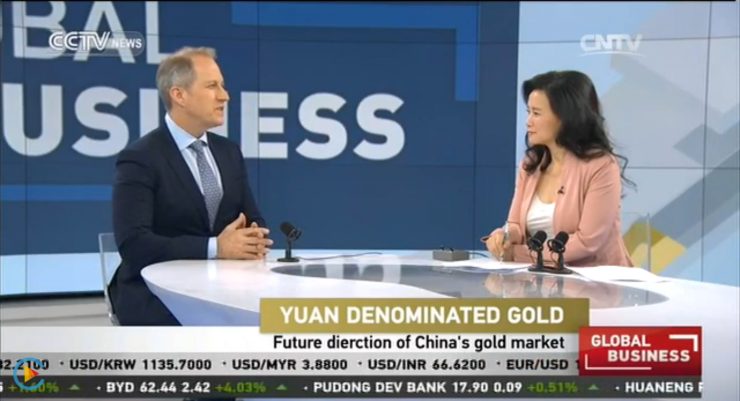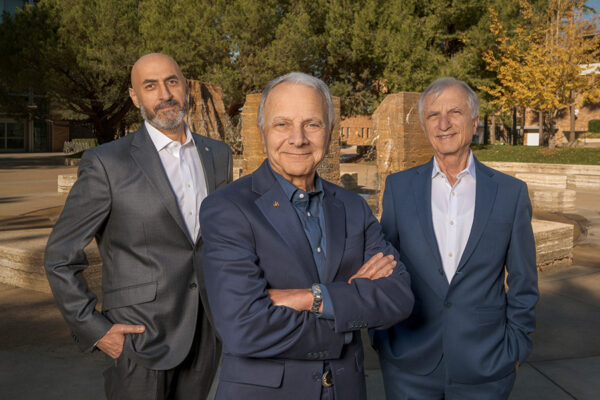Growing up in Los Angeles, Robert Koepp became fascinated with Asia.
He had Asian American friends, and absorbed happenings in that part of the world when his father watched the news.
“As I got older, there were more and more ways to apply that interest through study and then work,” he says.
After working, living and traveling in Asia and learning to speak Mandarin Chinese and Japanese, Koepp has come full circle to his native Southern California.

A Unique Focus
Early this year, Koepp launched the Asia-Pacific Geoeconomics and Business Initiative in partnership with Chapman University’s Argyros School of Business and Economics. The initiative held two events in March – including the first of a speaker series, with investment banking and sustainability expert Cynthia Wang – and is planning a summit and the unveiling of an index in fall.
Koepp sent his first monthly newsletter in March, cowrote a piece for the Orange County Business Journal and is making video commentaries on current issues, mostly recently about TikTok.
The new initiative may invite the question – why another thought center on Asia?
Koepp says centers at other universities focus on either international relations or culture.
“We’re unique, and the only center that has the combination of geopolitics, economics and business,” says Koepp, adding that many other centers only focus on a part of Asia.
“We’re looking at it as Asia-Pacific, meaning that it includes the United States and other Pacific-facing economies,” he says.
That includes an emphasis on California and Orange County.
“We’re part of the Asia-Pacific community,” Argyros Dean Henrik Cronqvist said at Wang’s talk in March. “You think it’s over there, but it’s also here literally because of the inflow of immigration into Orange County. Many businesses in our area have close ties to Asia … that is part of the world that is the closest to us from a business perspective, from an economics perspective. So that’s why we have this initiative.”
Wang said the point of such an initiative is also “to encourage more intellectual and practical partnerships.”
Experience in Asia
Koepp brings experience on both fronts. He was chief economist and senior editor for The Economist Corporate Network in Hong Kong, Asian representative for Marvel Entertainment and a communications adviser to China- and Japan-based companies listed on U.S. stock markets. He has lived in Japan, Singapore, Taiwan, China and Hong Kong.
Koepp was in Hong Kong in 2019 during the pro-democracy protests preceding the Chinese government’s introduction of a new national security law. The 2020 law gave Beijing more power to restrict civil liberties in the global commercial hub.
“It was very hard, because I always tried to be cognizant of my role as someone from outside the countries I’ve lived in,” he says. “I was always respectful but personally sympathetic to any cause for free expression and personal autonomy. So in that sense I was very much against what the Chinese government was trying to do to the people of Hong Kong but also appreciated that it is a complex issue.”
At the same time, he was on the ground.
“I definitely have inside understanding and can relate to things that way as someone who’s lived there and been part of society,” he says.
Although he was initially drawn to Asian culture, he learned that it’s intertwined with business.
“For example, in China one of the earlier dynasties uses the term “shang” that has come to stand for commercialism,” he says. “Also, if you look at its literature, they have classical works that talk about commerce, and how to manage commerce and its importance to Chinese society and politics.”
One way the institute can contribute to the Asia-Pacific discussion is weighing in on current events, like China-Taiwan tensions, he says.
“We’re not just looking at things abstractly from an economic standpoint,” he says. “We also look at what it means for businesses that are active in the value chain, and what their strategies need to be, and how do they react to these situations?”
Closer to home, Koepp notes that Irvine recently became the newest U.S. city with a relative majority Asian population.
“Now, these populations and businesses from here are interacting with the rest of the Asia-Pacific region,” Koepp says. “It’s very integrated. Our initiative also looks at things that way. We emphasize Orange County, but we also look beyond Orange County and even beyond Southern California.”
The initiative recognizes the way people and economies are connected globally.
“Even if you aren’t traveling anymore, you can use video communications and other platforms to virtually conduct business with Asia,” he says. “If anything, modern technology brings diverse corners of the globe closer together, making it more important to understand an area like Asia.”




